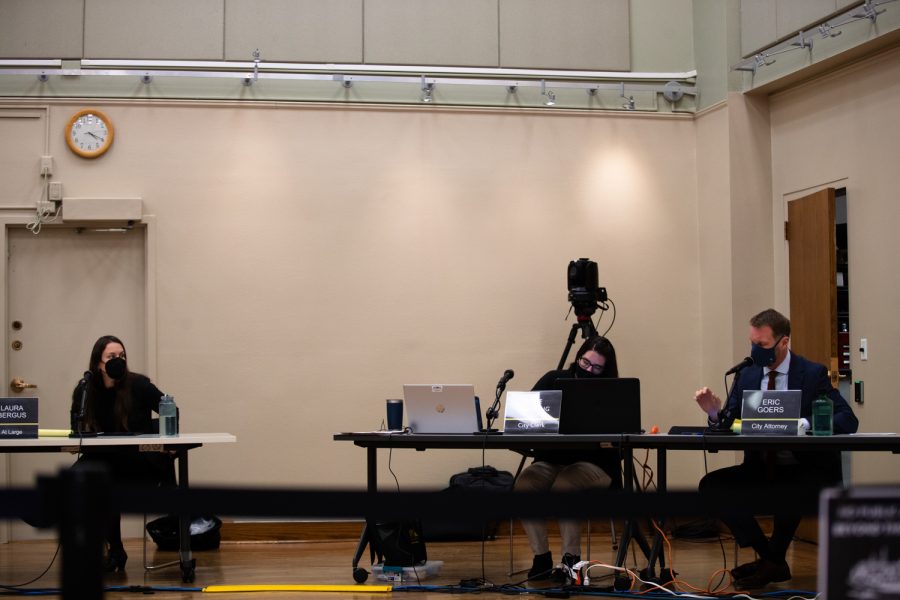Iowa City City Council looks to revise public comment rules
The council is narrowing public comment and barring conduct deemed repetitive, slanderous, or disruptive.
City Attorney Eric Goers talks about new proposed rules regarding public comment at an Iowa City City Council work session on Tuesday, Feb. 1, 2022. City councillors hoped for smoother meetings with the new proposed rules.
February 2, 2022
The Iowa City City Council is considering changing rules for public comment, which councilors say will ensure meetings are on-topic and uninterrupted. Critics say the rules will stifle public participation in meetings.
In response to public comments asking for more accessibility to council meetings, the council recently instituted hybrid meetings, where residents can comment via Zoom, in 2022.
The council asked Iowa City City Attorney Eric Goers to draw up new rules for the current and future councils. The draft of the rule changes drew criticism, with people saying they will limit the free speech of those who speak at meetings.
Amel Ali, vice chair of the Iowa City Ad Hoc Truth and Reconciliation Commission, voiced concerns with the revised public participation rules.
“During the discussion about these rules, you talked about intimidation from disruptive commentators,” Ali said. “But I’m worried about the intimidation of involving the police in a public setting. Arresting your disruptive constituents is not the answer.”
Ali referred to multiple bullet points from Rule 23 of the draft of the revised City Council rules which allows the Presiding Officer, currently Mayor Bruce Teague, to impose sanctions including suspensions from one or more meetings and charging violators with a municipal infraction or “one or more criminal offenses as applicable.”
Taylor Kohn was one of multiple vocal critics of Teague, with three individuals criticizing what they perceived as his desire to establish more stringent rules on public comment.
“Mayor Bruce Teague, it’s clear that you want to arrest people,” Kohn said. “It is obvious. You’ve been pushing for [rule changes] harder than anyone, and talking softly and nicely while you do so doesn’t make it any better. You’re clearly drooling to punish people for having the nerve to inconvenience you.”
One of the main concerns from the council was a perceived infringement on public participation and the First Amendment rights of Iowa City citizens. With the introduction of new rules, council members say they are trying to place more structure around public participation.
“There’s a bit of tension there, understandably so, between the First Amendment rights of an individual to express themselves along with the purpose and function of the meeting,” Councilor Janice Weiner said. “I’m wondering if there’s a way in which we can reconcile it because right now, it seems that reconciliation or mitigation is not viable, is what I’m hearing at least.”
The addition of a more structured public participation comes after an increase in more critical commenters and what the council called harassment of their members. Participation has also increased following public outcry over the distribution of the county’s Direct Assistance Fund and potential rule changes.
Rules 18 through 23, which were drafted by Goers, of the draft lay out structure that the council wishes to enforce at their meetings such as the manner in which council members are addressed, the content of the comment, the public’s right to address the council, and who should preside over the public comment section of council meetings.
“Persons making personal, repetitive, slanderous, or disruptive remarks or engaging in any action that otherwise impedes the orderly conduct of a Council meeting shall not be recognized by the Presiding Officer during the remainder of the meeting,” Rule 21 states.
Council members cited issues with the ability of the council to limit the free range of speech used by the public in comments during their work session on Tuesday afternoon.
“I think, as it’s presented to me, it could be that if you violate any of these things, then certain corrective action could happen,” Councilor Laura Bergus said. “I’m not comfortable saying that we’ll impose some sort of limitation on someone if they violate a rule that we’re all in agreement is probably not enforceable.”
Councilor Shawn Harmsen voiced concerns with the limiting free speech.He said he went back and reviewed the relevant legal scholarship regarding freedom of speech.
“Anything that shys into the area of addressing content, that’s a landmine,” Councilor Harmsen said. “Even though we wish people would not behave in a way that would maybe be slanderous or [use] personal attacks, my ruling on that is that we can’t legally do that.”






